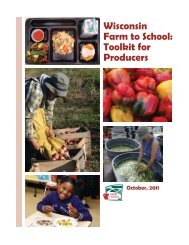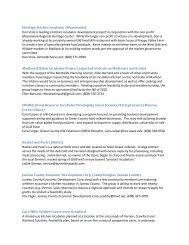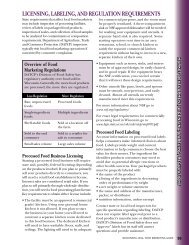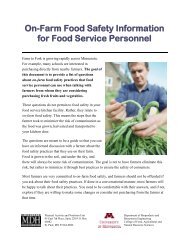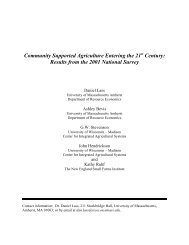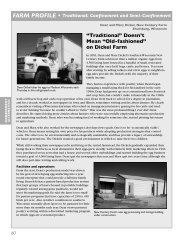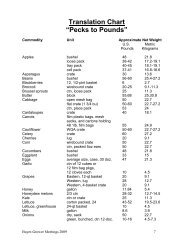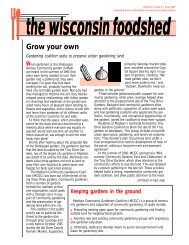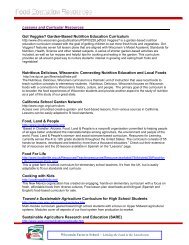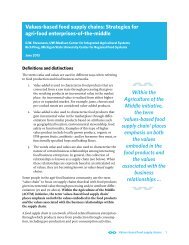Poultry Your Way - Center for Integrated Agricultural Systems ...
Poultry Your Way - Center for Integrated Agricultural Systems ...
Poultry Your Way - Center for Integrated Agricultural Systems ...
Create successful ePaper yourself
Turn your PDF publications into a flip-book with our unique Google optimized e-Paper software.
MANAGEMENT ALTERNATIVES<br />
ORGANIC<br />
Health and Welfare. In accordance with the National Organic Standards, poultry growers are responsible<br />
<strong>for</strong> ensuring the health of their flocks by: (1) designing housing and feeding areas so as to prevent predation and<br />
injury; and (2) developing an organically acceptable plan <strong>for</strong> preventing and treating disease.<br />
<strong>Your</strong> plan <strong>for</strong> preventing disease and other illness can include sanitizing incubators, disinfecting brooder houses,<br />
and using a nutritionally balanced feed. Routine vaccinations are permitted as a preventive measure against<br />
common avian diseases such as Marek’s, Newcastle, and coccidiosis.<br />
In the event that your birds become sick or injured, organic certifiers encourage the use of “alternative medicine”<br />
<strong>for</strong> treatment, since the majority of conventional medicines are not allowed under the National Organic Standards.<br />
As noted by NCAT specialists, however, farmers’ expertise in using alternative medicines is limited. When there is<br />
no other recourse, antibiotics and other conventional treatments are required to preserve the health of the sick<br />
or injured bird. In such instances, the treated bird(s) may never be marketed as “organic” and the birds must be<br />
physically identified as “nonorganic” using bands or by separation from organic birds.<br />
NCAT suggests finding a veterinarian who shares or supports your interest in organic production. “With such a<br />
vet as your … partner, it is much easier to develop treatment strategies that are holistic and NOP compliant, and<br />
that avoid the accidental use of prohibited medicines when suitable alternatives are available” (NCAT, 2004).<br />
A comprehensive resource <strong>for</strong> alternative poultry medicine and practices is Remedies <strong>for</strong> Health Problems of<br />
the Organic Laying Flock. This compendium addresses preventive care and health concerns using nutritional<br />
management and herbal and homeopathic remedies. The Chicken Health Handbook by Gail Damerow describes<br />
how pathogens and parasites are spread—in<strong>for</strong>mation that can aid you in developing preventive disease strategies.<br />
Damerow also makes recommendations <strong>for</strong> preventive measures (by stage of production) and treatment (mostly<br />
conventional) (see Resources under <strong>Poultry</strong> Health and Welfare).<br />
Labor. Due to recordkeeping requirements, organic poultry production may be the most labor intensive of all<br />
management systems. Recordkeeping is critical to ensure organic integrity and traceability. The National Organic<br />
Standards do not explicitly state the type and number of records required; this will depend on the complexity of<br />
your operation and on your certifier. Most organic growers maintain some or all of the following records:<br />
• Pasture maps with pen numbers and/or rangeland units<br />
• Accurate history sheets <strong>for</strong> fields, pastures, and breeding stock<br />
• Soil and water test reports<br />
• Verification of the organic status of chicks (if applicable), pullets, feed, seeds, and other purchases<br />
• Documentation of ef<strong>for</strong>ts to procure organic inputs (when not used)<br />
• Forage crop pest and disease monitoring reports<br />
• Production logs and activity reports<br />
• Flock health records: vaccination dates, mortalities, etc.<br />
• Labels from vaccines and any other medications or health inputs (electrolytes)<br />
• Breeding records<br />
• Labels from sanitizers and cleansers<br />
• Labels from purchased feed and feed supplements<br />
• Equipment, storage, and housing cleanout logs<br />
• Slaughter and processing records or verification of organic certification of slaughter facilities<br />
• Sales receipts or invoices<br />
• Sales records<br />
Talk with other organic poultry growers—find out how much time they spend tracking feed and supplements<br />
used, recording paddock rotations, and generally preparing <strong>for</strong> their meetings with certifiers.<br />
<strong>Poultry</strong> <strong>Your</strong> <strong>Way</strong> 87<br />
MANAGEMENT<br />
ALTERNATIVES



